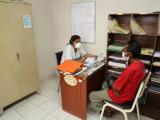Mar 27, 2012
Study: High pressure can reduce Salmonella in hot peppers
Researchers report that high hydrostatic pressure can be used to kill Salmonella in jalapeno and Serrano peppers, which were linked to a major US Salmonella outbreak in the summer of 2008. A team from the University of Delaware inoculated peppers with high doses of Salmonella and then subjected them to varying levels of pressure for 2 minutes at 20ºC, according to their report, published online yesterday by the International Journal of Food Microbiology. Before the pressure treatment, the peppers were either dry, briefly dipped in water, or soaked in water for 30 minutes. Overall, the researchers found that pressure treatment at 400 to 450 megapascals (MPa) in the soaked condition or 450 to 500 MPa in the briefly wetted condition rendered Salmonella undetectable. The investigators also found that high pressure could be used to reduce Salmonella in salsa and guacamole
made with Salmonella-contaminated raw peppers.
Mar 26 Int J Food Microbiol abstract
FDA clears way for cholera vaccine trials
PaxVax, a vaccine company based in Menlo Park, Calif., announced recently that the US Food and Drug Administration (FDA) has accepted its investigational new drug application for its single-dose cholera vaccine, clearing the way for the company to begin phase 3 clinical trials later this year. The company said in a press release that the live attenuated vaccine was previously approved and marketed in six countries under the name Orochol. According to a World Health Organization (WHO) background report, Crucell, maker of Orochol, suspended production of the vaccine in 2004 after it found problems in large-scale efficacy trials. PaxVax said the new formulation requires only one dose, compared with two for other cholera vaccines, and can provide protection in as little as 7 days. Kenneth Kelley, PaxVax's chief executive officer, said in the statement that, because the FDA classifies cholera as a neglected tropical disease, the vaccine could
quality for priority review.
Oct 2009 WHO cholera vaccine report
In other cholera vaccine developments, a pilot program in Haiti is still on hold due to bureaucratic problems, National Public Radio (NPR) reported today. The cholera vaccination demonstration project to administer cholera vaccine to 100,000 people was slated to begin in the middle of March but has been delayed by a host of issues. In the most recent glitch, vaccination teams are waiting for clearance from a national ethics committee, which has requested assurances that the vaccine is no longer considered experimental, according to NPR. Health workers are eager to begin vaccinating, because spring rains in Haiti have begun and the number of cholera cases is starting to rise.
Mar 27 NPR report
Two-drug regimen called effective against resistant TB strains
In laboratory tests, a two-drug regimen has proved very effective against antimicrobial-resistant strains of tuberculosis (TB), according to a report presented yesterday at the annual meeting of the American Chemical Society (ACS). The treatment involves two drugs that are already licensed: meropenem, an antibiotic, and clavulanate, an inhibitor of the beta-lactamase enzyme, the ACS reported in a press release. John Blanchard, PhD, said he and his team tested the combination against multidrug-resistant and extensively drug-resistant TB strains from patients. "In all cases, the combination doesn't just slow down growth—it kills the bacterium in laboratory tests," Blanchard said. The TB bacterium, Mycobacterium tuberculosis, secretes beta-lactamase, which destroys many antibiotics, but clavulanate blocks the enzyme's action, the ACS said. The drug combination has not yet been tested in clinical trials.
However, a physician in Brussels has published a case study in which the combination was used successfully to treat a 14-year-old girl who had severe TB, the ACS said. The release noted that meropenem is expensive but that its cost is likely to decline after it goes off patent later this year.
Mar 26 ACS press release

















